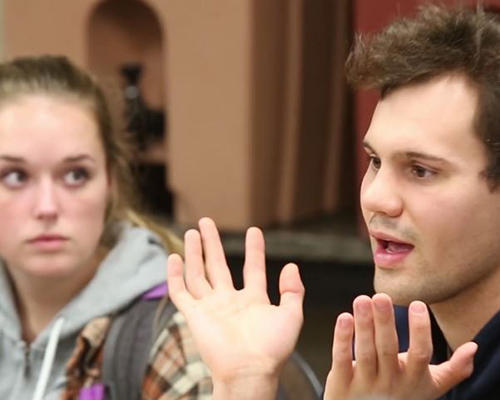Hundreds of Willamette students and members of the local community crowded into the Cat Cavern on Sept. 26, Oct. 9 and Oct. 19 to watch the presidential debates between candidates Hillary Clinton and Donald Trump.
It was the second presidential campaign in which Willamette has held a DebateWatch to encourage students and others to participate in and learn more about this essential exercise in democracy.
First held in 2012, DebateWatch is part of the “Public Sphere” course taught by Cindy Koenig Richards, an associate professor in the university’s Department of Civic Communication and Media (CCM). The course was designed to inspire students to actively participate, regardless of political affiliation.
“In class, we study theories about the relationship between discourse and democracy,“ says Richards. “DebateWatch gives students the opportunity to transform this knowledge into action by facilitating productive discussions in our community and around the world through social media.”
Four years ago, students, faculty, staff, journalists and other community members filled Montag Den to see Barack Obama debate Mitt Romney. Hundreds more watched the debates that followed, including one newspaper editor who wrote about his experience in a column titled “How Willamette University students restored my faith.”
Students taking the fall 2016 course faced an even bigger challenge than their predecessors in terms of analyzing the election campaign and the candidates. Instead of relying on newspaper and television for information, audiences now increasingly turn to social media such as Facebook, which uses an algorithm designed to select content based on what users have already viewed, liked or shared.
If a user clicks on a negative article about a candidate, they receive more negative articles about that person. Google adjusts search results based on search history and behavior as well, so results are more likely to confirm users’ biases — delivering what users want to hear so they keep using the website.
Through DebateWatch, students create spaces for informed discussion without the demagoguery or vitriol that often characterize contemporary political discourse in the media and on social media. Willamette was one of 40 universities and colleges across the country to participate in the events. Using the #WUDW, #TRDW and #DebateWatch hashtags to organize the discussions on Twitter, audience members responded to candidates’ remarks, checked facts in real time, and asked and answered questions.
“We don’t care who you vote for, but we do want you to look deeper into candidates’ positions,” says CCM major Caden Crowston ’18. “Willamette is very liberal, so conservative voices can get squeezed out of the discussion. By inviting diverse groups to campus and by focusing on ideas and issues rather than people, we want to encourage honest conversations about important issues.”
For most students, these events were their first opportunity to participate in a presidential election as a registered voter. “It was all new to me, and I was just taking it all in,” says CCM major Danielle Saunders ’18, who also emphasized the importance of inclusivity and reaching out to invite diverse on- and off-campus groups. “I think it’s important for all citizens in a democracy — especially college students — to hear the flip side of what they discuss in class or at home.”
Both students saw DebateWatch as an opportunity for colleges to kick-start public discourse. Crowston hopes the events move students from passive observers to active participants in the political process.
“Everyone’s busy, and it’s hard to take things you talk about and turn them into action,” he says. “I hope DebateWatch encourages honest public discussion and inspires more people to take individual action to support causes and candidates they support.”
In next week's Bearcat Bulletin, look for another article from the upcoming Willamette magazine's coverage of the 2016 presidential election.


